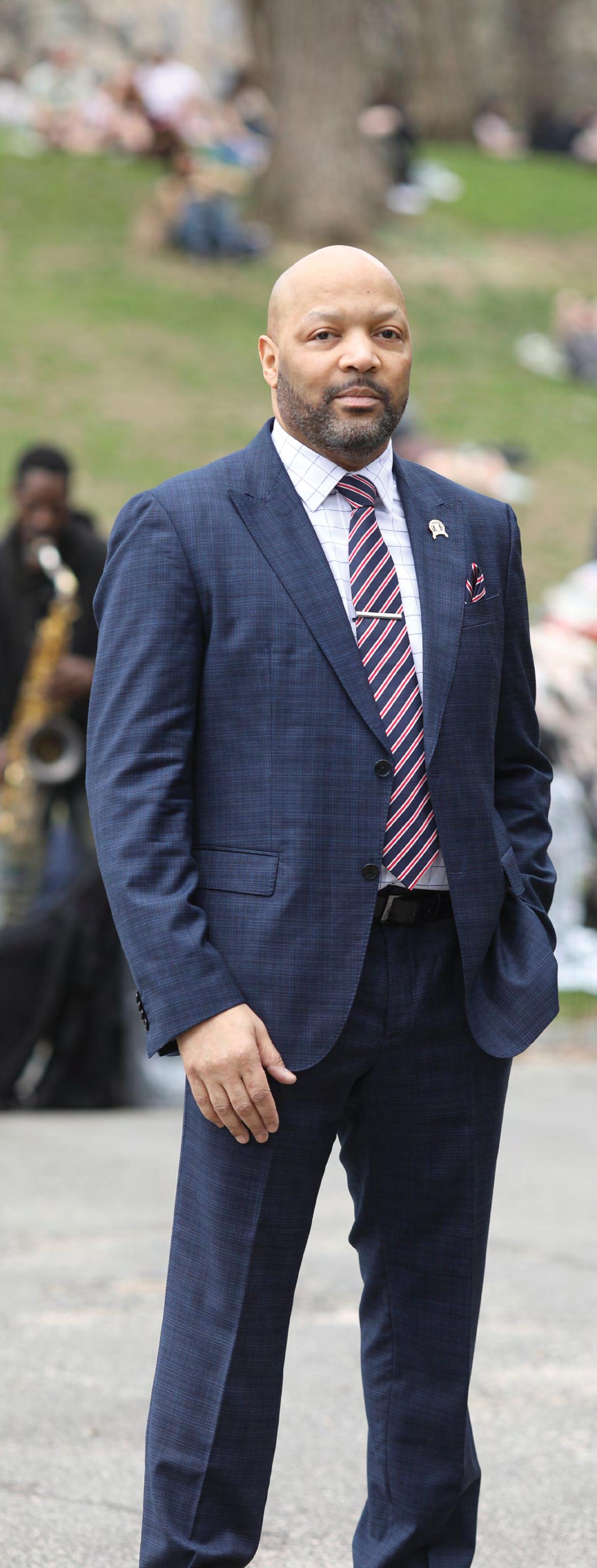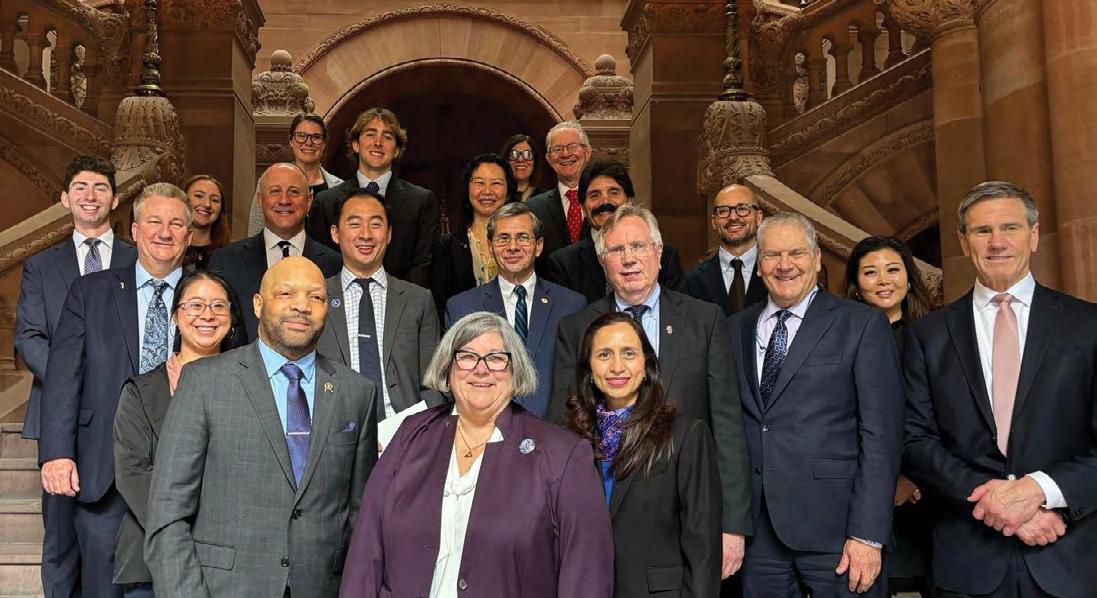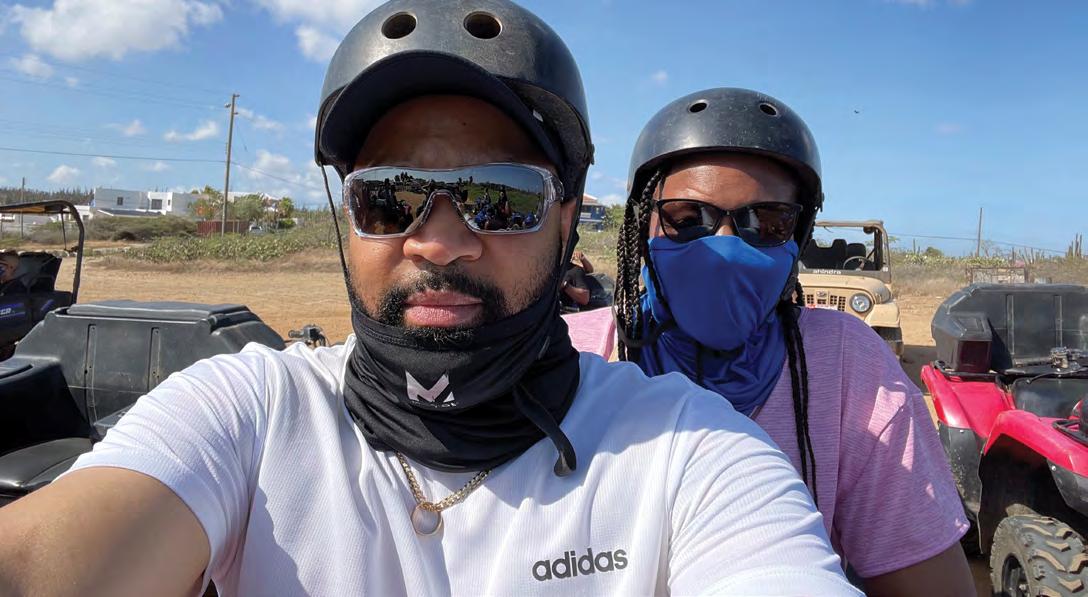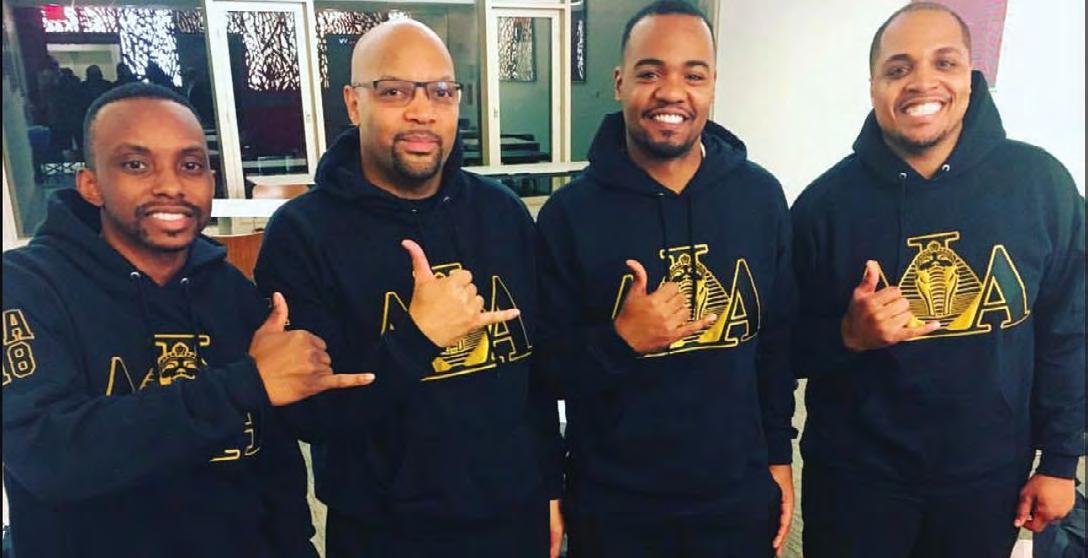
15 minute read
Turning the Page on the Past
Turning the Page on the Past
Maurice Edwards sees his presidency as an opportunity to look forward and begin again.
The New York State Dental Association welcomes Maurice L. Edwards, D.M.D., its 144th President.
BY THE TIME he stood to address the NYSDA House as its newly installed president, Dr. Maurice Edwards had already decided what he wanted his legacy to be. Having come into office as the Association was being roiled by differences of opinion that threatened the fabric of the organization, Dr. Edwards offered himself up as a healer.
Calling the moment “a turning point,” Dr. Edwards urged his colleagues “…not to look back in frustration, but to look forward with intention. Not to dwell on what went wrong, but to focus on what we can make right.” To that end, he promised to steer the Association toward healing, rebuilding, recommitting, leading and, importantly, toward remembering “we are not each other’s opponents; we are teammates.”

Maurice Luther Edwards, D.M.D., NYSDA’s 144th President, and the first person of color to hold the top elected post, admits to being an optimistic person, which should serve him well as he fulfills his self-described mission to remake the Association “stronger, smarter and more united than ever.”
An oral and maxillofacial surgeon, Dr. Edwards lives in the Nassau County community of Lynbrook. He grew up in the nearby village of Freeport. His practice, Maurice L. Edwards, D.M.D., P.C., is located in the heart of Manhattan, on East 60th Street. He did his undergraduate work at the University of Rochester, received his D.D.S. Degree from the University of Pennsylvania School of Dental Medicine and completed a residency in oral and maxillofacial surgery at Bellevue Hospital Center/NYU Medical Center.
In addition to his private practice, Dr. Edwards is an associate clinical professor at New York University College of Dentistry, Department of Oral and Maxillofacial Surgery; an attending physician at Mount Sinai Hospital, Department of Otolaryngology/Division of Oral and Maxillofacial Surgery; and at Mount Sinai West/St. Luke’s Department of Otolaryngology/Division of Oral and Maxillofacial Surgery. Two years ago, following a rigorous review process, he was appointed a police surgeon by the New York Police Department, placing him on call for emergency and nonemergency consultations for procedures for NYPD officers hurt in the line of duty and for their families. He performs similar duties as a state trooper surgeon for the New York State Police Troopers.
It Started with a Broken Tooth
Dr. Edwards likes to recount the story of how he got started in dentistry. It was when he was playing football in high school, he relates. He broke his front tooth right before a scheduled vacation.
“I was embarrassed,” he recalls, and “didn’t want to go. My mother took me to our family dentist, who in less than an hour fixed my broken tooth and as far as I was concerned, saved both me and my family vacation. The pride he had in his work and the feeling of completeness he gave back to me by restoring my smile were probably the biggest draws into dentistry for me.”
It was that one positive experience, he says, that put the medical profession on his radar. It may have triggered something else in the young man that remains with him today and that is a desire to better himself by helping others. It’s why there are few hours in his day that aren’t devoted to the work of organized dentistry, in service to its members; or ministering to the needs of the community, especially those who are less served; or pitching in in emergency situations—the oral and maxillofacial surgeon is also a volunteer firefighter with the Lynbrook Fire Department.
The Particulars
Dr. Edwards’s ascendency to the presidency of NYSDA is the culmination of many years of contributions made to organized dentistry. Highlights of his service include past president of the New York County Dental Society, former chair of the NYSDA Council on Communications and Membership, NYSDA Trustee and ADA Delegate, Washington Leadership Conference—New York State Action Team Leader, and Greater New York Dental Meeting Organizing Committee member.

He is a graduate of the ADA Institute for Diversity and Leadership, has participated in New York County Give Kids A Smile programs numerous times, NYCDS’s annual Charity Golf Outing, and has volunteered for community oral and cancer screening programs. His altruism is further reflected in his membership in Alpha Phi Alpha Inc., which has led him to participate in efforts to feed and clothe residents of homeless shelters in Brooklyn.
A Conversation with NYSDA President Maurice Edwards
Who are the members of your immediate family?
My wife, Michelle; children Keanna, Brianna and Christian; grandkids Kyrie and Kaleed; mother, Diann; father, Edward; brother, Mark, and his wife, Wendy; mother-in-law, Lola; and sister-in-law, Desiree.
What are your goals for the coming year?
To bring harmony to a turbulent Board by letting go of the past and moving forward to complete the business of the Association. I also want to help our governmental affairs team work on changing the scope-of-practice definition for dentistry. That as well as finding concrete solutions for the workforce shortage that is plaguing our state.
What are the greatest challenges facing dentistry and how should we respond?
One of the greatest challenges facing dentistry is the amount of educational debt that new dentists carry as they attempt to start their careers. This burden is forcing many graduates to forego specialty training out of fear of accruing more debt during their time in training.

The second biggest challenge is the constant downward trend of membership in organized dentistry. If we are unable to convince younger dentists of the positive impact the tripartite has on advocacy and the practice of dentistry, all three levels of the association will become powerless to effect change and then politicians and other specialty lobbying groups will be the ones who define how dentists practice their profession.
On top of declining membership, there are questions about the financial health of the ADA. We aren’t approaching a critical time at the ADA; that time is now. And leadership needs to find a solution that makes membership worth every dollar spent on dues. If not, within a very short time, we will find our market share to be less than 50% and our ability to influence legislators will be lost.
You are involved in a lot of organized groups, but being a member, especially a contributing member of a specialty organization, does not seem to be so important today. How do you propose making organized dentistry more relevant and attractive to young dentists in particular? I agree that organizations are having a difficult time getting and retaining members. This is a result of both financial constraints and, possibly, the loss of perceived value. I think organized dentistry needs to rethink what members want from their association.
The ADA is trying to use artificial intelligence to gather information on what individual member’s interests are and then tailor benefits to that member. The hope is that if a member is more interested in, say, continuing education or dental technology or buying or selling a practice, his or her benefits would be tailored to offering discounts towards CE credit or on services from groups that help purchase or sell practices, or directed towards a group of retailers who offer dentists great deals on their purchase of dental technology.

The idea is to tailor the information coming from organized dentistry toward each individual dentist. It will require an enormous amount of thinking power on the part of the association to give each member what it is they need at the time they need it, at the price they want and as quickly as they want.
Is there a chance organized dentistry will cease to exist if it doesn’t change? Has it become too expensive?
I believe organized dentistry will always exist because most professionals enjoy having contact with their colleagues, to compare notes and learn of possible solutions to common problems and experiences. I’m not sure if membership has become too expensive or if newer dentists are drowning under educational debt and tend to be more careful about what they spend their money on. So, organized dentistry needs to prove its value to new dentists to make membership more desirable.
The problem dentistry is having is not specific to our profession. It’s seen across all member-based organizations. The fact that it’s easy for individuals to find the things that organizations offer online and at less cost has left a lot of membership-based organizations struggling to identify what it is they can do and offer their members that members can’t easily find on their own.

In dentistry in particular, the practice model has slowly changed so that new dentists are more interested in joining DSOs, which provide them with continuing education, malpractice insurance and opportunities to meet up with colleagues to exchange ideas. Organized dentistry at the national, state and local level is dealing with these declining trends, trying to find ways to make itself a more valuable proposition for these new dentists.
The strongest thing organized dentistry provides is its advocacy; however, as we lose more and more of the market share of practicing dentists, as older dentists retire and aren’t replaced by newer dentists, organized dentistry will find it more difficult to secure a seat at the table with legislators.

Are you an optimistic person? Do you have a guiding philosophy that keeps you going?
I definitely believe I’m an optimistic person. I have several philosophies that I live by. One is “You can sleep when you’re dead.” Another is “If you are not at the dinner table, you were on the menu.” And lastly, “I am my brother’s keeper.” These are the principles that allow me to get up every day and function as a productive member of whatever organization or group or event that I plan to give my time to.
I truly believe we were all put on this earth to do the best we can to make this world a better place. It is my goal to do everything I can to provide for my family while doing as much good for this planet as I can. I joined the fire department believing that if I can use my spare time to save just one life, I’ll feel I’ve done a little more good while on this earth. And I understood during my residency at NYU and Bellevue Hospital that I had the opportunity to save several lives and restore faces to provide those patients with a better quality of life. I sit with my fraternity brothers and plan charitable events and other community programs to give back to those who are less fortunate than I am. I joined the Knights of Columbus after the passing of my father-in-law as a tribute to him and as a way to continue the good work he did while he was alive. He was a veteran and someone I looked up to. I became involved with many of the other organizations I belong to for the same reasons more or less— because I believe we can touch more people as a collective than as individuals.

Lastly, my parents didn’t raise me to be lazy or useless. While I have the energy and the ability, I will strive to do things that make the world just a little bit better, so that when it’s my time to finally sleep, I can rest peacefully.
Any thoughts on being the first person of color to hold the top elected post of NYSDA?
I would be lying if I did not say that I feel the immense weight and honor that goes with being the first person of color to
serve as president of the New York State Dental Association. It causes a little self-induced pressure only because I understand that those from my ethnic group or other ethnic groups will be watching me either hoping I have a successful year or to see if I perform as well as my predecessors did. It is my goal with every task I undertake to leave the situation better than I found it. It’s no different with NYSDA. I sincerely hope that when I’m done, people will look back on all the work I did with the volunteers and Board of Trustees and say, he did a really good job. Then I’ll be happy.

My goals are simple: to instill trust and enable the Board to work productively with me, with each other and with staff. We will continue to push our legislative priorities. Chief among these is our scope-of-practice bill, medical loss ratio and I hope something that addresses the workforce shortage.
I want my legacy to be when people look back at my presidency they simply say, he did his best and he was a good guy. We have already had our first Board meeting, and every member cooperated to give us a great start to this administration. With everyone working hard to move forward, everything else will be icing on the cake.
Tell us about your career as a volunteer firefighter. Do you actually fight fires?
My career is in its infancy. I only recently graduated from one level of firefighter academy, where I learned the essentials. I’ll return to learn primaries, which will allow me to be an interior firefighter. Until I finish that course, most of my firefighting will be limited to the external portions of buildings and vehicle fires. For the most part, I am with the medical company of the Lynbrook Fire Department, where we are on call once a week but may be asked to be available daily by page to respond to medical emergencies, car accidents or fires. Eventually I expect to be asked to respond to interior structural fires, vehicle fires and wildfires if necessary.
Some people have asked why an oral and maxillofacial surgeon would join the volunteer firefighting company? My answer is simple. I have the energy, the desire to help and I do not like to be bored. Plus, my daughter and my son joined the department, and my wife is a member of the auxiliary firefighter company, so it’s a family affair.
What drives you to do all the different things you do?
My family. I’ve always been an ambitious person, and I try to impart that to my kids. I firmly believe you show your true self through your actions. Every time I had an interest or desire or wish I wanted to come true, I focused on making it happen without fear of failure. I am fortunate both my parents are alive to share in my success. I was the second one in our family to complete college, following in my brother’s footsteps. Both he and I made it our mission to make sure all our children finish college, which they did, and several of them went even further to get their master’s degrees.

Michelle and I are doing everything we can to have a successful business with the hope that one of our children will eventually enter dentistry and take over the practice. Michelle runs the office, she answers the phones, schedules patients, orders supplies, collects payments, communicates with referring doctors, sends prescriptions and verifies insurances, among her many responsibilities. I think it’s safe to say that everything that we do is with the hope that we provide our kids with a better life than we had. And that they will do the same for their children and their children’s children and so on.
Overall, Michelle and I consider ourselves extremely fortunate to have lived the lives we have. We couldn’t be prouder of our children and the rest of our family and hope we’ve passed on a little bit of our luck to all of them. If just a small part of what we wish for them becomes reality, then we can say we lived a life worth living.










